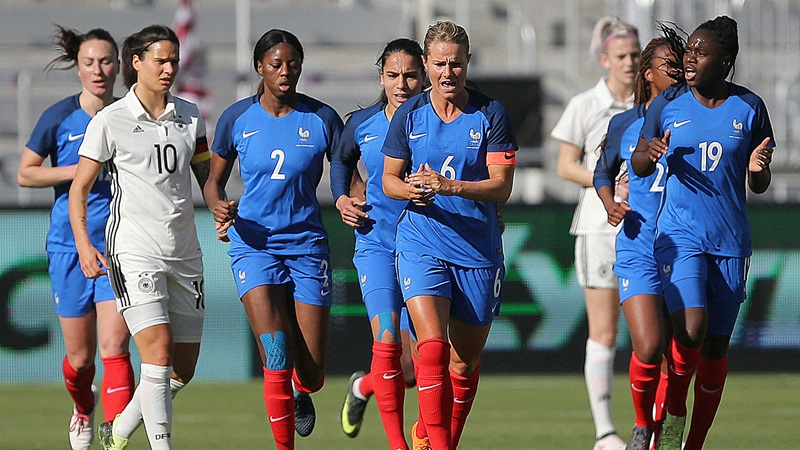Introduction to the French Women’s National Football Team
Ladies and gentlemen, get ready to witness a revolution on the football field! In this blog post, we delve into the remarkable journey of the France Women’s National Football Team and how they are breaking barriers, challenging societal norms, and propelling gender equality forward in the world of sports. From their humble beginnings to their awe-inspiring achievements, this team has not only captured hearts but also sparked a change that resonates far beyond the confines of any stadium.
So, fasten your seatbelts as we embark on an exhilarating ride through history, adversity, triumphs, and aspirations with these extraordinary athletes who refuse to be confined by outdated stereotypes. Get ready to celebrate resilience, determination, and most importantly – equality! The French women’s national football team is here to stay – let’s dive right in!
| Nickname(s) | Les Bleues (The Blues) | ||||||||||||||||
|---|---|---|---|---|---|---|---|---|---|---|---|---|---|---|---|---|---|
| Association | Fédération Française de Football (FFF) | ||||||||||||||||
| Confederation | UEFA (Europe) | ||||||||||||||||
| Head coach | Hervé Renard | ||||||||||||||||
| Captain | Wendie Renard | ||||||||||||||||
| Most caps | Sandrine Soubeyrand (198) | ||||||||||||||||
| Top scorer | Eugénie Le Sommer (92) | ||||||||||||||||
| FIFA code | FRA
|
History of Women’s Football in France
The history of women’s football in France traces back to the early 20th century, when the sport started gaining popularity among women. However, it wasn’t until much later that organized leagues and national teams were established.
In 1918, the first official women’s football match took place in Paris between two local teams. Despite facing opposition and discrimination from societal norms at the time, these pioneering players continued to pursue their passion for the game.
The French Women’s Football Federation was founded in 1970, marking a significant milestone for women’s football in France. This allowed more opportunities for female athletes to compete at both domestic and international levels.
Over the years, the French Women’s National Football Team has made great strides on the global stage. They have consistently performed well in major tournaments such as the FIFA Women’s World Cup and UEFA Women’s Euro Championship.
Their breakthrough came in 2011 when they reached their first-ever World Cup semifinals. Since then, they have continued to make remarkable progress with standout performances by talented players like Eugenie Le Sommer and Amandine Henry.
These achievements not only showcase their skill but also inspire young girls across France to dream big and break barriers. The team serves as role models proving that gender should never limit one’s ability or potential.
Despite facing challenges such as unequal pay and limited media coverage compared to men’s football, these obstacles have only fueled their determination to fight for equality within sports. The team has actively spoken out against discrimination through campaigns promoting inclusivity and fair treatment of female athletes.
One notable initiative is “Football Féminin,” which aims to increase participation of girls in football at grassroots level by providing access to coaching resources and support networks throughout schools nationwide.
Looking ahead, there are ambitious plans for further growth of women’s football in France including investment into infrastructure development and increased funding opportunities for clubs competing at professional levels.
As we celebrate the accomplishments of the French Women’s National Football Team, it is clear that they have paved the way for gender equality.
Challenges and Obstacles Faced by the Team
Challenges and obstacles are a part of any journey, and the French Women’s National Football Team is no exception. They have faced their fair share of hurdles in their quest for equality on the field.
One major challenge has been breaking down stereotypes and societal norms surrounding women in sports. For years, football was seen as a male-dominated sport, with limited opportunities for female athletes. The team had to fight against this ingrained bias and prove that they belonged on the same stage as their male counterparts.
Another obstacle has been securing adequate funding and resources. Historically, women’s football has received less investment compared to men’s football, resulting in disparities in training facilities, coaching staff, and overall support systems. This lack of resources can hinder the development and progress of the team.
Additionally, there is still a long way to go when it comes to public perception and media coverage. Despite their accomplishments, the French Women’s National Football Team often receives less attention than their male counterparts. This lack of visibility not only affects financial opportunities but also perpetuates gender inequalities within sports.
Furthermore, discrimination within the industry remains an ongoing challenge for female players. From pay disparities to unequal treatment by officials or opponents on the field, these issues continue to plague women’s football at various levels.
However, despite these challenges, the team continues to push forward with determination and resilience. Their success serves as an inspiration for future generations of female athletes who dream of playing professional football without limitations or prejudice.
The French Women’s National Football Team is paving the way for gender equality in sports by defying expectations both on and off the field. Through their talent, perseverance, and passion for what they do,
they are challenging societal norms,breaking barriers, and creating a more inclusive environment for all aspiring athletes.
They have proven time and time again that women deserve equal recognition and opportunities in sports.
Their achievements resonate far beyond just winning matches; Hey represent progress, empowerment, and the triumph of equality. As they continue to make.
Achievements and Successes of the Team
The French Women’s National Football Team has achieved remarkable success over the years, solidifying their status as one of the top teams in the world. Their achievements on and off the field have made a significant impact in promoting gender equality in sports.
On the international stage, the team has had several notable accomplishments. They reached new heights by winning their first major tournament, the UEFA Euro 2017, defeating England in a thrilling final. This victory not only showcased their exceptional talent but also proved that women’s football deserves equal recognition and respect.
In addition to their Euro triumph, they have consistently performed well at other prestigious competitions such as the FIFA Women’s World Cup. The team finished fourth in both 2011 and 2019 editions, demonstrating their ability to compete against strong opponents from around the globe.
Individually, many players from the French Women’s National Football Team have garnered recognition for their outstanding skills and contributions to women’s football. Players like Eugenie Le Sommer and Amandine Henry are celebrated for their technical prowess and leadership qualities on and off the pitch.
Moreover, these achievements extend beyond medals and accolades. The team serves as role models for aspiring female athletes everywhere by breaking gender stereotypes associated with sports. Their success inspires young girls to pursue careers in football without fear or hesitation.
Off-field initiatives by members of the team further emphasize its commitment to promoting gender equality within society. Many players actively advocate for better pay equity between male and female athletes while raising awareness about issues faced by women in sport through various campaigns.
The successes of France Women’s National Football Team have undoubtedly contributed significantly towards achieving greater gender equality in sports globally. As they continue striving for excellence on all fronts – be it performance or representation – they pave an inspiring path for future generations of female athletes who aim to break barriers traditionally imposed upon them.
Impact on Gender Equality in Sports
The impact of the French Women’s National Football Team on gender equality in sports cannot be overstated. Their achievements and successes have not only inspired a generation of young girls to pursue their dreams, but they have also shattered stereotypes and challenged societal norms.
By showcasing their skill, determination, and passion on the field, these incredible athletes are proving that women can excel in traditionally male-dominated sports. They are breaking down barriers and demanding equal treatment both on and off the pitch.
Moreover, the team has become powerful advocates for gender equality through various initiatives and campaigns. They use their platform to raise awareness about issues such as pay disparity, lack of opportunities for female athletes, and discrimination faced by women in sports.
Their efforts have sparked important conversations around gender equality in sports at both national and international levels. By speaking out against inequality and standing up for what they believe in, they are paving the way for future generations of female athletes to thrive.
In addition to being role models for aspiring athletes everywhere, the French Women’s National Football Team is inspiring change within institutions themselves. Their success has put pressure on organizations to invest more resources into women’s sports programs, provide equal funding opportunities, and promote inclusivity at all levels.
As a result of their dedication and perseverance, we are seeing progress towards greater gender equality in sports. More young girls now have access to quality training facilities, coaching staff who believe in them regardless of gender identity or background,
While there is still work to be done – unequal pay remains an issue among many others – it is clear that the French Women’s National Football Team is making a significant impact on advancing gender equality within the realm of athletics.
They continue to challenge outdated attitudes towards women in sport with each game they play – proving time after time that talent knows no boundaries when it comes to gender. So let us celebrate these remarkable trailblazers who are rewriting history one goal at a time!
Initiatives and Campaigns by the Team to Promote Equality
The French Women’s National Football Team is not just a group of talented athletes on the field; they are also champions off the pitch when it comes to promoting equality in sports. Recognizing their platform and influence, the team has taken various initiatives and campaigns to challenge gender stereotypes and break down barriers.
One notable initiative is their partnership with organizations that advocate for women’s rights and empowerment. By aligning themselves with these groups, the team amplifies their message of equality and showcases their commitment to making a difference beyond football.
In addition, the players actively engage in community outreach programs aimed at inspiring young girls to pursue their dreams, regardless of societal expectations. Through workshops, clinics, and mentoring sessions, they provide guidance and support to aspiring female athletes who may face obstacles along their journey.
Furthermore, the team consistently uses social media as a powerful tool for spreading awareness about gender inequality in sports. They share stories of resilience, highlight achievements of women in various fields, and call out instances of discrimination or unfair treatment.
Another campaign spearheaded by the team focuses on challenging harmful narratives surrounding female athletes’ appearance. By embracing diverse body types and celebrating strength over societal beauty standards, they send a strong message that talent should be recognized above all else.
Through these initiatives and campaigns, France Women’s National Football Team demonstrates that equal opportunities should exist for all individuals passionate about sports – regardless of gender. Their efforts not only inspire future generations but also encourage other institutions within sports to prioritize inclusivity.
Whether it’s through partnerships with advocacy organizations or grassroots outreach programs targeting young girls’ empowerment – this team shows us what true leadership looks like both on and off the field!
Future Goals and Plans for Continued Progress
The French Women’s National Football Team has made incredible strides in promoting gender equality in sports, but they are not resting on their laurels. Looking ahead, the team has set ambitious goals and formulated plans to continue pushing for progress.
One of their main objectives is to increase participation and support at the grassroots level. They plan to work closely with local communities, schools, and clubs to encourage more young girls to take up football and provide them with equal opportunities for development. By nurturing talent from a young age, they hope to create a strong pipeline of female players who can compete at the highest level.
In addition, the team is focused on enhancing professional opportunities for women in football. They aim to secure increased investment and sponsorship deals that will allow female players to earn a living wage through their sport. This will not only provide financial stability but also attract top talent and improve overall competitiveness.
Furthermore, the French Women’s National Football Team recognizes the importance of representation both on and off the field. They are committed to increasing diversity within coaching staffs as well as leadership positions within federations and organizations. By having more women involved in decision-making roles, they believe it will lead to more inclusive policies that benefit all athletes.
They plan to leverage their platform as role models by continuing campaigns that promote gender equality beyond just sports. Through collaborations with NGOs and social initiatives, they want to use their influence to address broader societal issues such as combating stereotypes or tackling discrimination against women.
As we look towards the future of women’s football in France, it is evident that the French Women’s National Football Team is determined not only be successful on the field but also leave a lasting legacy of gender equality in sports. Their goals are bold; their plans are strategic; now it’s time for action! Stay tuned for exciting developments as this inspiring team continues its fight for equal rights!
Conclusion: The Importance of a Strong Female Role Model in Sports
The French Women’s National Football Team has undoubtedly made significant strides in paving the way for gender equality in sports. They have overcome numerous challenges and obstacles, showcasing their talent and determination on the international stage.
Through their achievements and successes, they have shattered stereotypes and proved that women can excel in football just as much as men. Their remarkable performances at major tournaments have not only brought glory to their country but also inspired countless young girls to pursue their dreams of playing football.
Moreover, the impact of this team extends beyond the boundaries of sport. By challenging traditional norms and advocating for equal opportunities, they have sparked important conversations about gender inequality in society as a whole. Their presence on the field sends a powerful message: women deserve to be respected, valued, and given an equal platform to showcase their abilities.
The French Women’s National Football Team has also taken proactive steps to promote equality through various initiatives and campaigns. From speaking out against discrimination to partnering with organizations dedicated to empowering women in sports, they are actively working towards creating a more inclusive sporting landscape.
Looking ahead, this team has ambitious goals for continued progress. They aim to secure even greater recognition for women’s football within France and globally. By continuing to challenge existing barriers and fostering an environment where all athletes can thrive regardless of gender, they are setting a precedent for future generations of female athletes.
In conclusion (without using those exact words), it is clear that having strong female role models like the members of the French Women’s National Football Team is crucial for inspiring change both on and off the field. Their dedication, skill, and resilience serve as an inspiration not only for aspiring athletes but also for anyone striving towards gender equality in any domain.








